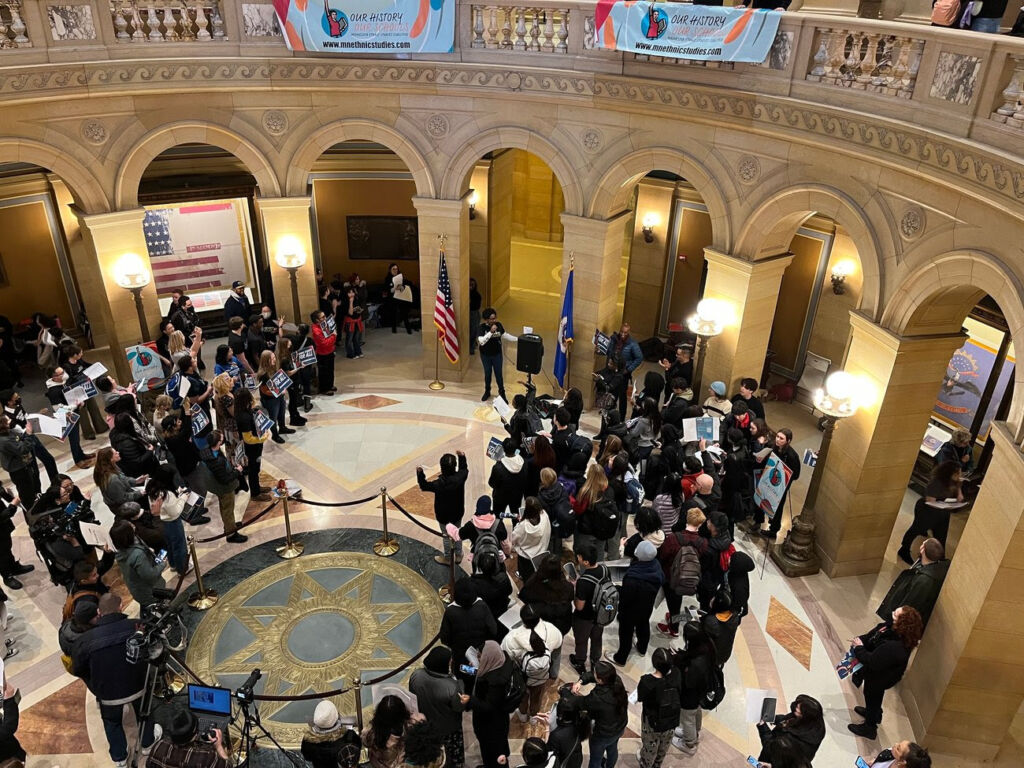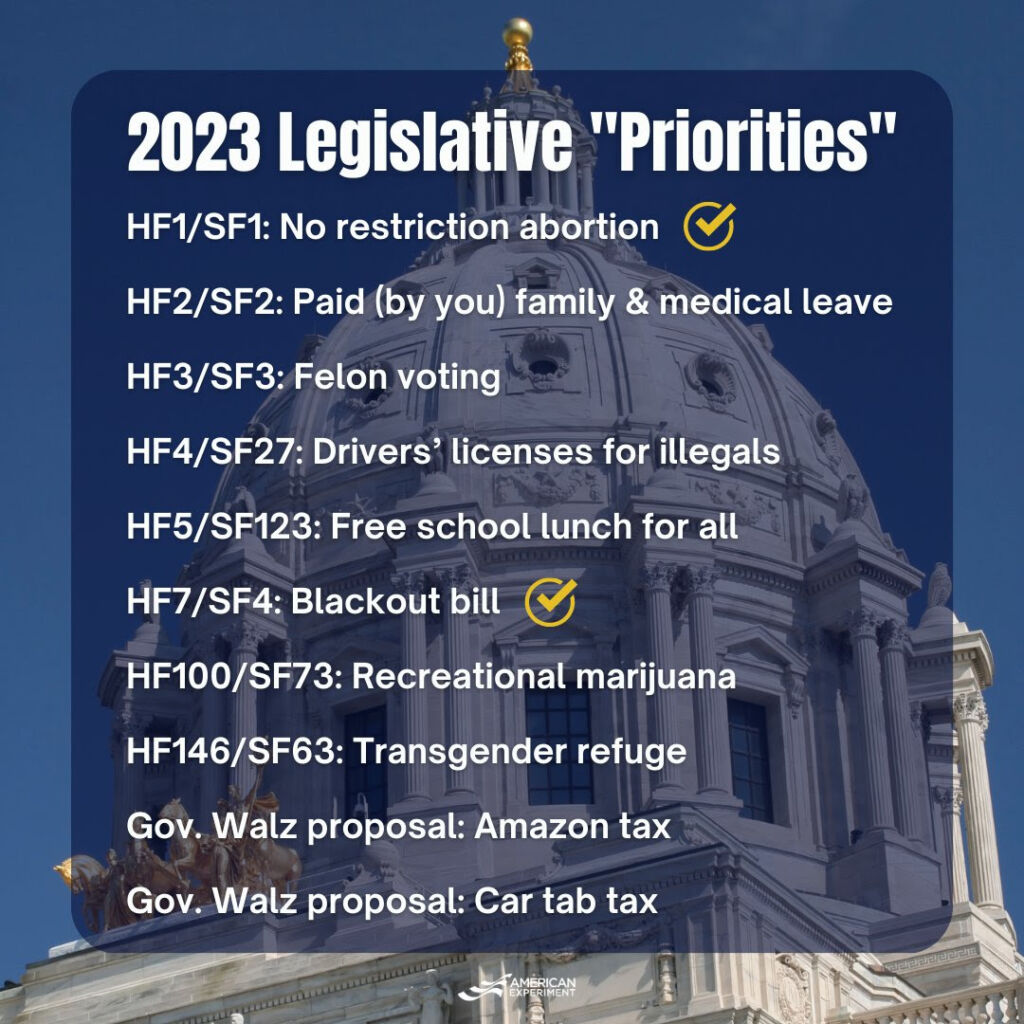Ethnic studies grad requirement is wolf in sheep’s clothing
Ethnic studies bill is wolf in sheep’s clothing
While most of their peers were in algebra or English class Monday morning, a group of students gathered in the Capitol rotunda to listen to speeches in favor of a bill adding ethnic studies as a requirement for graduation. Samantha Sencer-Mura, a new Democratic legislator from Minneapolis and author of the bill (HF 1502), took to the podium and lamented the fact that she didn’t learn about the internment of her Japanese ancestors while attending high school in Minneapolis. Rep. Sencer-Mura and other speakers at the rally talked about the need for all students to “see themselves in the curriculum.”

Proponents of ethnic studies are careful to frame the issue in terms of content, not methodology. They claim ethnic studies is about topics like the American Civil War, the civil rights movement or the Japanese internment referenced by Sencer-Mura. And that framing is working with Minnesotans, as our Winter 2023 Thinking Minnesota poll showed narrow support (51%) for the concept of ethnic studies among Minnesota respondents.
If only it was that harmless. In fact, the plain language of the bill makes it clear that ethnic studies is about race and power.
“Ethnic studies” means the critical and interdisciplinary study of race, ethnicity, and indigeneity with a focus on the experiences and perspectives of people of color within and beyond the United States. Ethnic studies analyzes the ways in which race and racism have been and continue to be powerful social, cultural, and political forces, and the connection of race to other groups of stratification, including gender, class, sexuality, religion, and legal status.
The bill also tells the Minnesota Department of Education to create a “model curriculum” for ethnic studies and directs school districts to adopt the “model” curriculum or something exactly like it.
The model curriculum must:
(1) use various forms of pedagogy to meet all students’ needs, including participatory
or research-based models for real-world connections to the current society;
(2) include a power, race, class, and gender analysis as part of the course via literature,
discussion, classwork, and homework as the analysis relates to ethnic studies courses; and
(3) include an intersectional analysis of climate, health, food, housing, education, and
policy.
The model curriculum prescribed by state law has some very concerning language.
- “Participatory models for real-world connections to the current society” will become teacher-led student activism.
- “Power, race, class and gender analysis” is the heart of Critical Race Theory — pitting students against each other based on their race.
- “Intersectional analysis of climate, health, food, housing, education and policy.” Whoa. We are way beyond teaching about the Japanese internment.
As my colleague Katherine Kersten wrote last week, the real goal of ethnic studies is “to divide and embitter students on the basis of their skin color and group identity, and to dismantle and transform America’s fundamental institutions.”
When framed this way, Minnesotans don’t support ethnic studies. Returning to the Winter 2023 Thinking Minnesota poll, 52% of respondents said they were less likely to support ethnic studies when told it was less about teaching students about different cultures and more about a divisive agenda to disrupt and dismantle America’s fundamental institutions. Thirty-one percent were much less likely to support it on those terms.

Social studies standards laid the framework
The fight for radical ethnic studies began well before the 2022 election with the Walz administration’s adoption of new academic standards for social studies. American Experiment warned Minnesotans about critical race theory being permanently embedded into the standards with the creation of a new ethnic studies strand, joining history, economics, civics, and geography. The current draft social studies standards are well-positioned to aid teachers in ethnic studies instruction. It’s always been part of the larger plan.
Meanwhile, the time kids spend in school has not increased and now ethnic studies will be required learning for all students, from kindergarten through high school. The proposed law usurps the power normally granted to local school boards over curriculum and provides for an expedited rulemaking process, meaning the ethnic studies standards and curriculum could be developed in 60 days with no public input.
If Minnesota schools were leading the nation in math and reading instruction, perhaps there would be time for another requirement, but that’s not the case. Only half of Minnesota students are proficient in reading and math.
Democrats are getting arrogant
As the bill sailed through the House Education Committee this week, Jeff Peterson, a citizen and volunteer with the Minnesota chapter of the Foundation Against Intolerance and Racism (FAIR), testified against the radical nature of the ethnic studies bill. When he was finished, Rep. Cheryl Youakim (DFL-Hopkins) tried to embarrass him by asking about his academic credentials. She then asked a pro-ethnic studies testifier about his credentials as a matter of comparison. It was an arrogant display that had nothing to do with the merits of the bill.
By the way, the pro-ethnic studies testifier was DOCTOR Brian Lozenski of Macalaster College, who proceeded to impress the committee with his curriculum vitae. Readers of Thinking Minnesota may remember Katherine Kersten introducing us to Professor Lozenski and some of his greatest hits in the Spring 2022 issue:
Lozenski was candid about this in an article titled “The Black Radical Tradition Can Help Us Imagine a More Just World,” which he wrote in June 2020 during the George Floyd riots. There, he describes the riots as “mass uprisings against racialized state violence,” which portend “the inevitable death” of the American “social order that prioritizes vulgar economics.” After COVID closings, Lozenski concludes, “Schools need only reopen if they join the social unrest and actively combat the greater public health crisis of systemic racism (emphasis added).”
No doubt Lozenski will be appointed to the Ethnic Studies Working Group established in HF 1502 and charged with writing the model curriculum.
In 2023 Minnesota, Democrats are listening to pointy-headed, radical college professors instead of parent volunteers backed by the highly-credentialed FAIR. The ethnic studies bill will likely be included in the omnibus K-12 Education Finance Bill later this session. School choice can’t come soon enough.

Click here to get caught up on all Capitol Watch newsletters from this legislative session!
Subscribe to Capitol Watch
Minnesota political news from an insider’s perspective.